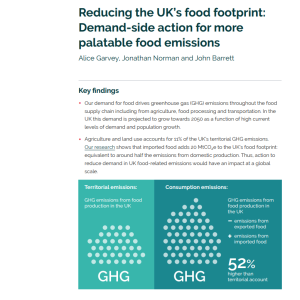
This report from the UK-based Centre for Research into Energy Demand Solutions quantifies greenhouse gas emissions arising from the UK’s food sector. It finds that when emissions are accounted for using a consumption basis (which accounts for emissions associated with imported and exported food), emissions are 52% higher than when a territorial basis is used (only including emissions generated within the country).
The report also quantifies the potential impacts of shifting to more plant-based diets, following guidelines on energy intake, and reducing food waste. With action across all these demand-side areas, annual territorial food emissions in the UK could be reduced by 52% between 2017 and 2050, or a 49% reduction in consumption-based emissions. The figure below illustrates the magnitude of reduction coming from each category.
Image: Figure 3, Garvey et al. Cumulative GHG emissions (2017-2050; territorial and consumption) according to each mitigation option and ambition case. BAU: Business-as-usual scenario, extrapolating historic trends.
Read the full report, Reducing the UK’s food footprint: Demand-side action for more palatable food emissions, here. See also the TABLE explainer What is a healthy sustainable eating pattern? and the TABLE report How Low Can We Go?







Post a new comment »